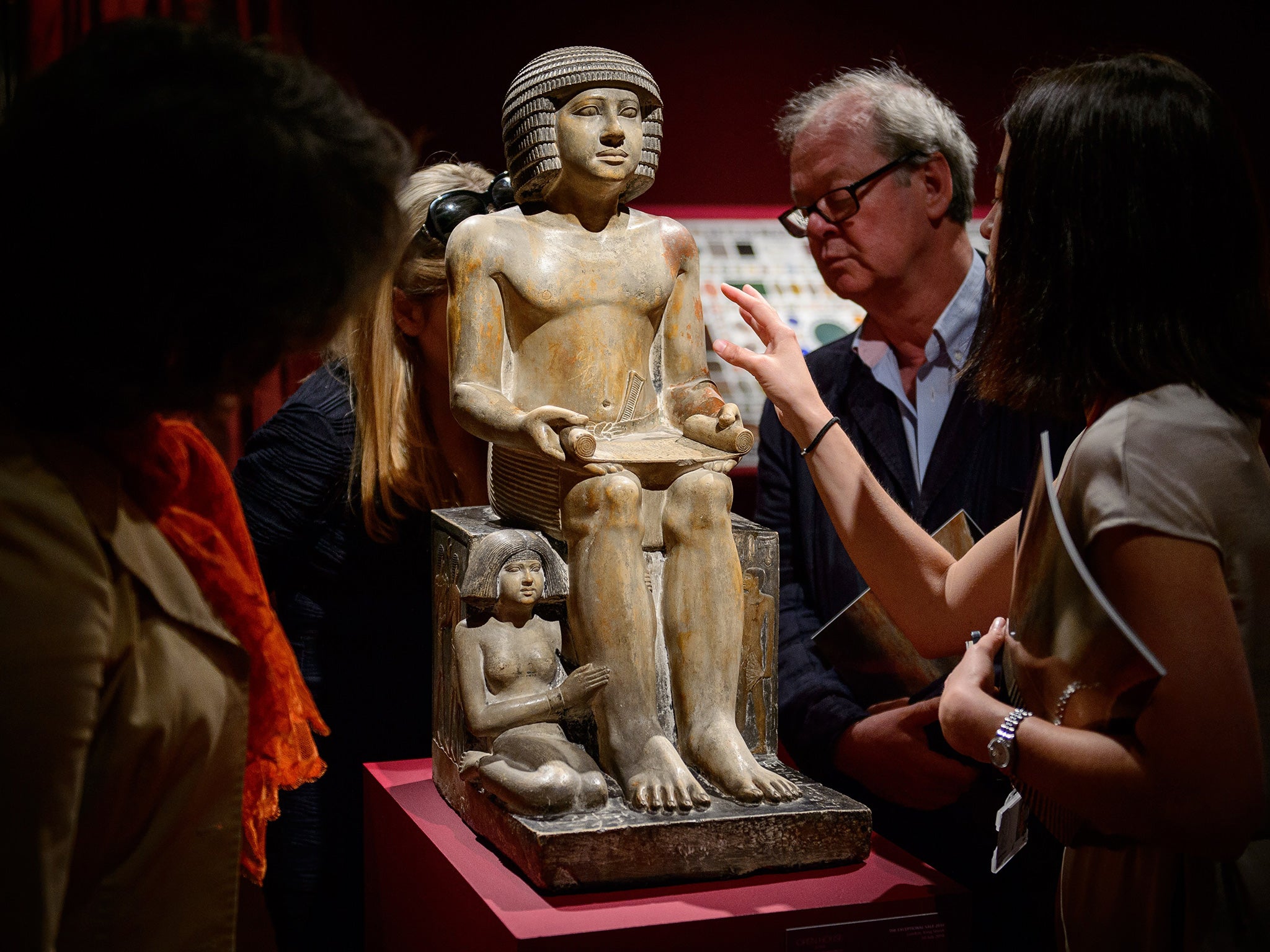Egypt in crowd-funding campaign to save ancient statue sold by UK museum
The 4,500-year-old statue of a scribe called Sekhemka was sold at auction for nearly £16m in July last year

Your support helps us to tell the story
From reproductive rights to climate change to Big Tech, The Independent is on the ground when the story is developing. Whether it's investigating the financials of Elon Musk's pro-Trump PAC or producing our latest documentary, 'The A Word', which shines a light on the American women fighting for reproductive rights, we know how important it is to parse out the facts from the messaging.
At such a critical moment in US history, we need reporters on the ground. Your donation allows us to keep sending journalists to speak to both sides of the story.
The Independent is trusted by Americans across the entire political spectrum. And unlike many other quality news outlets, we choose not to lock Americans out of our reporting and analysis with paywalls. We believe quality journalism should be available to everyone, paid for by those who can afford it.
Your support makes all the difference.It is a prized treasure from ancient Egypt, spirited away from its home country in the 19th century to grace the stately home of a British aristocrat and recently acquired by a mystery buyer in controversial circumstances.
The 4,500-year-old statue of a scribe called Sekhemka – sold at auction by Northampton Museum for nearly £16m in July last year – could disappear for good into a wealthy collector’s private museum when an export ban imposed on it expires at the end of this month.
However Egypt’s government has now appealed to Egyptians to help raise the money to return the “irreplaceable masterpiece” to its native country.
“The sale of the statue is an indelible stain on the museum’s reputation and is a moral crime against world heritage in general and the Egyptian heritage in particular,” Egyptian antiquities minister Mamdouh al-Damaty said.
“I am calling all Egyptians around the world to help Egypt to preserve its ancient Egyptian heritage and to collect the required fund to buy the Sekhemka statue.”
Mr al-Damaty warned that the statue might “never be seen on public display again”.
He also said that Egypt had halted all dealings with Northampton Museum over the sale, which has proved highly controversial in the UK.
Arts Council England has stripped Northampton Museum of its accreditation status until at least 2019, meaning it is no longer eligible for a string of public grants and other funding, because the sale breached conditions covering the disposal of historic artefacts.
The limestone statue, which is about 2.5ft high, shows Sekhemka and a smaller figure, assumed to be his wife, kneeling beside him. The scribe’s ability to read and write at a time when very few could conferred significant status.
Spencer Compton, the second Marquis of Northampton, acquired the statue during a trip to Egypt in around 1850, but it was donated to the museum by the family about 30 years later.
Last month, three academics from University College London, Professor Stephen Quirke, Dr Richard Bussmann and Dr Alice Stevenson, wrote to The Guardian, saying that the exact circumstances of how the statue was acquired was unclear.
“No one knows who owns the statue, or how and when it left Egypt or entered the museum,” they said.
“Archival research may yet reveal that the sale contravenes international law.” It added: “The sale tarnishes the reputation of the country and its museums.
“In the museum, the statue was safe under national law: it is about to leave the protection of a public museum and enter private hands without legal safeguards. We may never see it again.
A group of Egyptian activists started a campaign last month, urging the Egyptian government to recover the statue, saying it “belongs to the Egyptian people”.
Gunilla Loe, who chairs the Northampton-based Save Sekhemka Action Group, said she opposed the sale of such artefacts, partly because it encouraged looting. She said she hoped to persuade the British and Egyptian governments to work together to persuade the buyer to allow the statue to be put on public display. “It should not be shut away anywhere – it’s far too beautiful for that,” Ms Loe said.
The export ban was due to expire last month but was extended by one month. A spokeswoman for the Department of Culture, Media and Sport said the export ban could be extended again if there were signs that a buyer willing to keep the statue in the UK could be found within the next few days.
It is thought the statue may be shipped overseas to a wealthy collector if the export restrictions are lifted.
Join our commenting forum
Join thought-provoking conversations, follow other Independent readers and see their replies
Comments